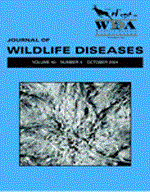Preventing pregnancy in brucellosis-infected bison (Bison bison) provides a potential means of preventing transmission of disease. To determine whether a gonadotropin-releasing hormone (GnRH) vaccine was effective in reducing pregnancy in bison and to study the safety of injecting GnRH in pregnant bison, a study was conducted at the Idaho Fish and Game Wildlife Health Laboratory in Caldwell, Idaho (USA). Four pregnant and two nonpregnant female bison were given a single injection of GnRH vaccine, and five pregnant adult females were given a sham injection that contained only adjuvant. Three of the GnRH-vaccinated bison that were pregnant at the time of vaccination delivered healthy calves. One treated bison had dystocia that resulted in a dead calf. All control bison delivered healthy calves. After calving, females of both groups were exposed to two bulls. Treated bison were palpated 6 wk after exposure to the bulls, and blood was drawn for pregnancy-specific protein B analysis. The six treated bison were not pregnant. The sham-treated bison became pregnant and delivered viable calves. This study demonstrates that a single dose of GnRH vaccine is effective in preventing pregnancy in female bison for at least 1 yr.
How to translate text using browser tools
1 October 2004
CONTRACEPTION OF BISON BY GnRH VACCINE: A POSSIBLE MEANS OF DECREASING TRANSMISSION OF BRUCELLOSIS IN BISON
Lowell A. Miller,
Jack C. Rhyan,
Mark Drew

Journal of Wildlife Diseases
Vol. 40 • No. 4
October 2004
Vol. 40 • No. 4
October 2004
bison
GnRH vaccine
gonadotropin-releasing hormone
immunocontraception




